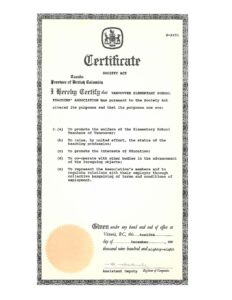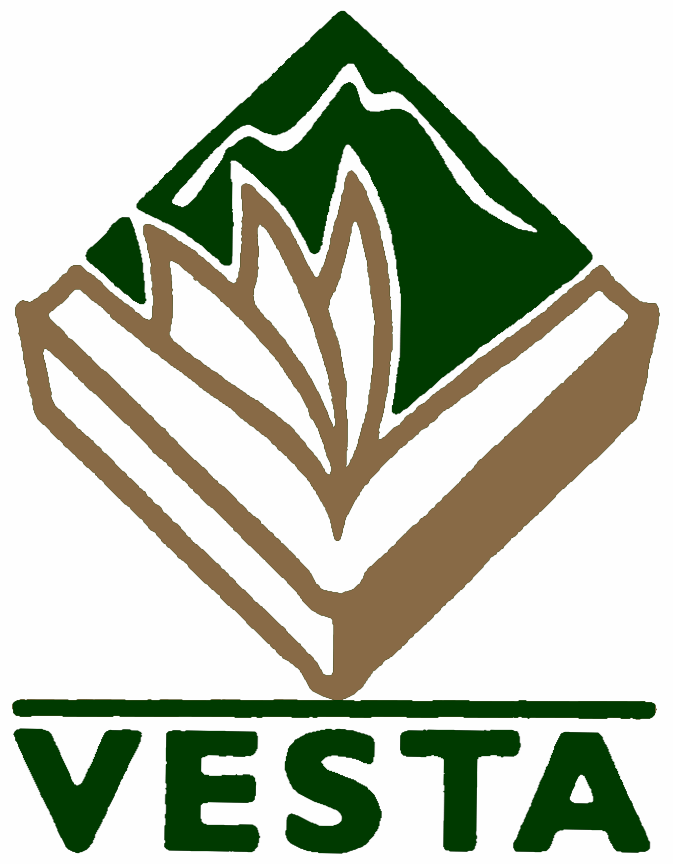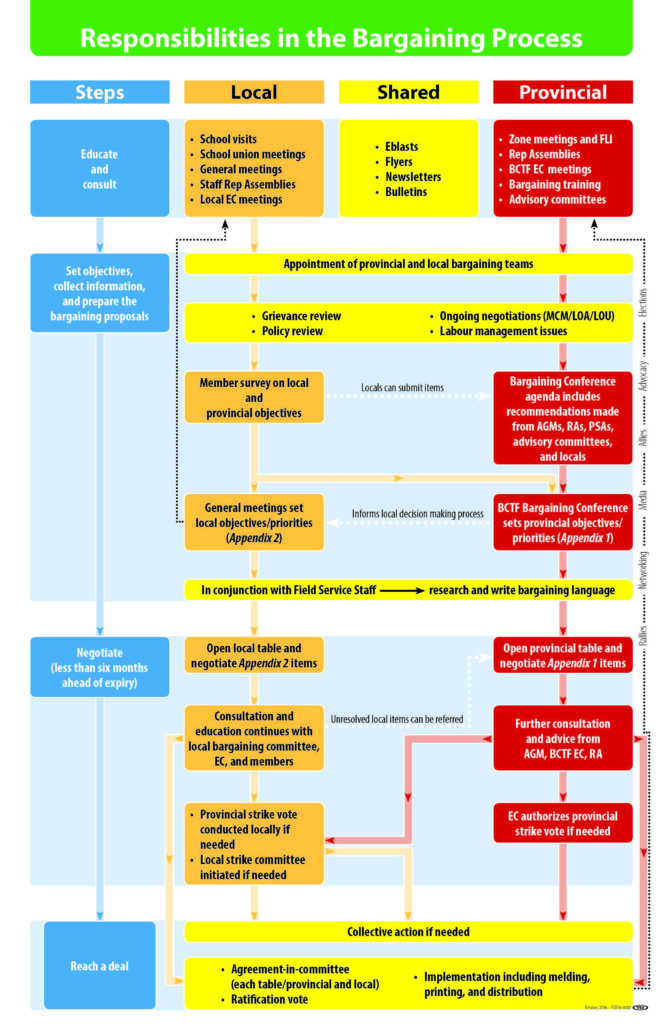Working and Learning Conditions/Bargaining
WLC/B Committee Chairperson: Greg Canning
VEAES invites you to join the WLC/B Committee and/or attend meetings, held once a month from 4-5:30 pm.
Terms of Reference of the Working and Learning Conditions/Bargaining Committee
That the terms of reference of the Working and Learning Conditions/Bargaining and Committee
be:
- To become familiar with bargaining issues, data and the bargaining process
- To survey membership needs
- To make recommendations regarding bargaining objectives.
- To build membership support for the bargaining process.
- To facilitate member understanding of the bargaining process.
- To monitor working and learning conditions in Vancouver Elementary schools.
- To make recommendations to the VEAES Executive Committee regarding bargaining matters.
- To carry out work assigned by the VEAES Executive Committee.
- To work jointly with VSTA Working and Learning Conditions/Bargaining Committee when and if needed
- To monitor the implementation of the terms and conditions of the Collective Agreement
- To build member awareness of the Collective Agreement.
Bargaining History
 The bargaining history of VEAES (Vancouver Elementary and Adult Educators’ Society) is unique in British Columbia. No other BCTF local is comprised only of Elementary School Teachers, and no other local has a sub-local of Adult Educators who negotiate their own local Collective Agreement.
The bargaining history of VEAES (Vancouver Elementary and Adult Educators’ Society) is unique in British Columbia. No other BCTF local is comprised only of Elementary School Teachers, and no other local has a sub-local of Adult Educators who negotiate their own local Collective Agreement.
Part of the reason our history is divergent is that Vancouver Elementary Teachers were among the first to organize in the province. Here is a brief history of how VEAES came to represent Elementary School Teachers in Vancouver:
Our first meeting, then called the “Teachers’ Association, Vancouver” was held in September 1891, where teachers met to discuss matters “pertaining to the profession”. After that, monthly meetings were held to continue to “discuss methods and reading papers on teaching”.
In November 1914, the Vancouver Teacher Association was formed at a meeting with very separate sections that included Principals, Supervisors, Vice Principals, Senior Teachers (Grades 7,8), Senior High Teachers, Intermediate Teachers (Grades 5,6), Junior High Teachers, Junior Teachers (Grades 3,4), Manual Training Teachers, Primary Teachers (Grades 1,2) Domestic Science Teachers.
The Vancouver Teacher Association negotiated our first contract with the school board, which was also the first teacher contract in the province, in 1929, a full 58 years before becoming a local of the BCTF.
Sub groups of the VTA began to feel that their diverging interests could not be adequately represented by one organization, and as a result, the Vancouver Elementary Teachers’ Association was formed in November 1930, and changed to VESTA (Vancouver Elementary School Teachers Association) n October, 1935. The Vancouver Secondary Teachers’ Association (VSTA) was formed in June, 1935.
Throughout the 1930s and 1940s, the Vancouver Teacher Association continued to negotiate improvements to salary, pay equity for women, and other working conditions.
Adult and Continuing Education existed in Vancouver, but those teachers were not organized into a union, and worked as part of Continuing Education at the Vancouver School Board. Some Adult Educators were certified teachers.
In November 1987, the BCTF granted a charter for local association #39 (Elementary), and the next year, the VTF was declared the bargaining agent for teachers in Vancouver by the Industrial Relations Council. Our separate Associations (VESTA and VSTA) became one certified bargaining unit, but maintained the operational independence of our two separate Associations.
Throughout the preceding time frame, the Vancouver Teacher Association and then the Vancouver Teachers’ Federation negotiated all working and learning conditions directly with our employer, the Vancouver School Board. We negotiated local agreements that provided Vancouver Teachers with some of the strongest class size and composition and benefits language in the province.
In 1994 the NDP government introduced the Public Education Labour Relations Act, imposing provincial bargaining on all BCTF locals in the province, VEAES continues to advocate for full local bargaining to be restored, and takes advantage of all opportunities to protect and defend our Collective Agreement through bargaining as well as the grievance process.
Since 1994, Adult Educators have played an important role within VEAES. While they maintain a distinct Adult Ed Executive Committee and hold independent General Meetings, Adult Educators are active within VEAES as In-House Table Officers, Local Reps to the BCTF, members of the Grievance Committee, and on the VEAES Executive Committee.
In all matters relating to our Collective Agreement, VEAES and VSTA together represent the teachers of Vancouver. We have diverse policy, values and perspectives, but we share a Collective Agreement with our employer as defined by the Labour Code. Adult Educators have a distinct and separate relationship with the Vancouver School Board due to their distinct and separate Collective Agreement, however, many of the issues we face are of shared concern to K-12 teachers and Adult Educators.
In matters related to our membership in the BCTF, the BC Federation of Labour and the Vancouver District Labour Council, we represent Elementary Teachers only, as we are a distinct teacher local in the eyes of our union. The BCTF does not currently recognize VEAES Adult Educators as a sublocal of VEAES, so for BCTF representative purposes, Vancouver Adult Educators attend decision-making meetings as VEAES members.
In our K-12 Collective Agreement, there are some clauses that are specific to Elementary or Secondary Teachers, but unless specified, the language applies to the members of both organizations.
VEAES represents Vancouver Speech Language Pathologists, who may or may not hold Teaching Certificates as well as many district teaching staff, such as Teacher Psychologists, Area Counsellors, Mentors, Consultants, Distributed Learning Teachers and Teachers On Call. Our non-school based members work in classrooms, hospitals, in Adult Education Centres and self-paced Learning Centres, with homeschooled students, and in residential treatment and care facilities. Our diversity is reflected in our Collective Agreement, and in the way we work towards equity in the interpretation of our members’ rights.
In 2022, VESTA’s name was updated to VEAES to acknowledge and more accurately reflect our membership.
Responsibilities in the Bargaining Process
This flow chart identifies the process used for the setting of local and provincial objectives, and follows these objectives through the bargaining process.
Appendix 1 and 2 of the K-12 Collective Agreement outline which items can be negotiated at the local table, and which items are currently required to be negotiated at the provincial table. The BCTF and VEAES both have policy that a return to full local bargaining is preferential.
The peach colour represents the responsibilities and timelines of the Local. Because VEAES and VSTA share the same Collective Agreement, we negotiate as co-signatories to the Collective Agreement, and therefore our bargaining teams reflect proportional representation of our two organizations. [see “VEAES bargaining history” link for more information on this]
Consultation with members happens in many ways prior to the setting of objectives; membership surveys, General Meetings and Staff Representative Assemblies. Through those same meetings, the grievance process, as well as Vancouver Teachers’ Federation (VEAES and VSTA combined) meetings, we determine priority improvements to our Collective Agreement.
Appendix 1 (provincial items) are forwarded to the provincial bargaining conference, and require the support of the provincial membership to proceed.
Appendix 2 (local items) are agreed upon by a VTF General Meeting in advance of bargaining.

